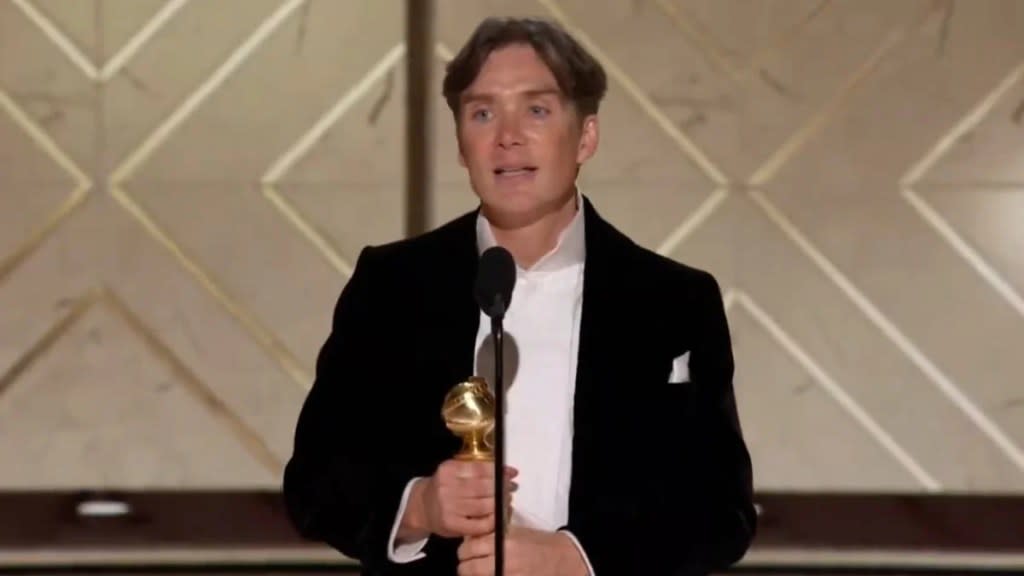Golden Globes Make a Case for ‘Oppenheimer’ and ‘Poor Things’, but Not Much of One for Themselves

It only took two awards for a winner to address the elephant in the room at the Golden Globe Awards on Sunday night. Robert Downey Jr., who won the supporting-actor award for “Oppenheimer,” thanked a variety of folks in his sardonically witty way, and then turned to the voters who’d put him on the stage of the Beverly Hilton.
“To the Golden Globe journalists,” he said, drawing out that last word, “thanks for changing your game, and therefore changing your name.”
This year’s Golden Globes changed the name of their voting body (the old Hollywood Foreign Press Association has been dissolved), changed the number of voters to 300, changed from a nonprofit enterprise to a for-profit one and changed its ownership when it was bought by Todd Boehly’s Eldridge Industries and Dick Clark Productions.
But did it change its game? Based on Sunday night’s show, the answer is “yes, but … ”
Yes, but the new voters made many of the same choices that the old voters probably would have made.
Yes, but the whole idea of the Golden Globes – a boozy, loose awards show with low stakes but high visibility – feels a little silly these days.
Yes, but if Hollywood publicists, studios and streamers were uncomfortable with the version of the Globes run by the HFPA with its ethical lapses and lack of diversity, Sunday didn’t provide any solid reasons for them to embrace the new, for-profit version.
Yes, but barring a surprisingly strong rating on Monday, it’s hard to imagine CBS rushing to broadcast future ceremonies.
The awkward, clunky and long show was different, to be sure: Ricky Gervais, the most memorable of all Golden Globe hosts, won the first-ever Globe for standup comedy and didn’t even show up to accept his award. The host they did find, Jo Koy, bombed with an opening monologue that turned out to be all about how bad his opening monologue was, and how we shouldn’t blame him because he only got the job 10 days ago and didn’t write all of the jokes.
And the new slant of the international voters became clear an hour into the show, when French writer-director Justine Triet won the screenplay award for “Anatomy of a Fall” over “Barbie,” “Oppenheimer,” “Killers of the Flower Moon” and others. That was the first of a few resounding reminders that three-quarters of the current Globes voters live and work overseas, and that the perspective from which these awards are given out is now defiantly an international one.
That perspective got a boost when the Japanese film “The Boy and the Heron” won the award for animated feature over the favorite, “Spider-Man: Across the Spider-Verse,” and then was completely reinforced when “Poor Things,” from Greek director Yorgos Lanthimos, beat “Barbie,” “The Holdovers” and “American Fiction” for Best Motion Picture – Musical or Comedy.
The Globe voters did, however, have the sense to give the award in one of their new categories, Cinematic and Box Office Achievement, to “Barbie” – not because it necessarily deserved to beat, say, “John Wick 4” or “Taylor Swift: The Eras Tour,” but because Margot Robbie and Greta Gerwig proved to be such moving spokespersons for the movie and the cinematic experience that they almost justified a category that would otherwise seem like calculated opportunism.
In the end, a very American movie, Christopher Nolan’s “Oppenheimer,” did what it needed to do by winning the Best Motion Picture – Drama award, as well as Best Director for Nolan and acting awards for Cillian Murphy and Downey Jr. Among the other big winners, Emma Stone was charming, Da’Vine Joy Randolph was emotional and the male winners, Cillian Murphy and Paul Giamatti, were amusing and cogent.
But if Golden Globe speeches are auditions for more important awards down the line, “Killers of the Flower Moon” star Lily Gladstone may have gotten the biggest boost with a passionate speech that made a case for the historic nature of her win for her performance as a Native American woman in Martin Scorsese’s opus.
In the television categories, voters went for “Beef,” “Succession” and “The Bear” and not much else, which the old HFPA might well have done if it were still around.
And then, as he was signing off, Jo Koy said, “Hollywood is back!” He might be right; the grosses for “Oppenheimer,” “Barbie” and “The Eras Tour” would argue that he is.
But are the Golden Globes back? Sunday’s show certainly didn’t make much of a case for that.
The post Golden Globes Make a Case for ‘Oppenheimer’ and ‘Poor Things’, but Not Much of One for Themselves appeared first on TheWrap.


